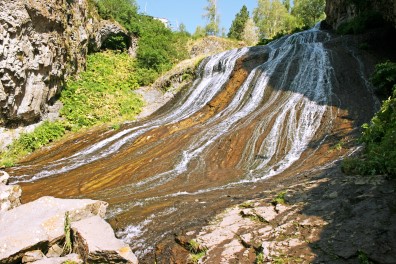1. What is the vision and mission of your organisation?
 The vision is to protect the Armenian peoples’ need for a sustainable water supply and drainage without harming the ecosystems. The mission of our organisation is the cooperation on acceleration of water supply and sanitation services in Armenian communities, water resources’ protection, water professionals’ capacity building as well as implementation of modern, advanced, economically and ecologically effective technologies and approaches in the sphere of water supply and sanitation.
The vision is to protect the Armenian peoples’ need for a sustainable water supply and drainage without harming the ecosystems. The mission of our organisation is the cooperation on acceleration of water supply and sanitation services in Armenian communities, water resources’ protection, water professionals’ capacity building as well as implementation of modern, advanced, economically and ecologically effective technologies and approaches in the sphere of water supply and sanitation.
2. Why did you decide to become a GWP Partner?
Our organisation has been working with water for quite a long time; we have been implementing regional and local projects on the usage and management of water resources. Since GWP is a network organisation that aims to promote IWRM principles in countries and regions, we decided that being a GWP partner would give us an opportunity to get acquainted with the new water resources management methods and widen our field of activities. There was a need to communicate with water professionals from other countries. At the same time, big changes had taken place in Armenia (implementation of new laws, creation of new institutional structures, etc.), and we were looking for an opportunity to accelerate water management in our country.
3. What have you found to be the benefits of being a GWP Partner?
The partnership gave us an opportunity to create a close cooperation with water professionals in the region and all over the world; it fostered experience and information exchange between specialists and countries, and created premises for the joint projects’ development.
Tools and management mechanisms from the GWP workshops (ToolBox, CapNet and others) gave us an opportunity to improve our knowledge and strengthen the management capacities.
As a result of the partnership, our company has developed a new technology on integrated water basins management plan, which was approved by the specialists from GWP CACENA.
4. What is one challenge facing the management of water resources in your area of expertise?
The absence of an integrated approach is one of the key problems in the water resources management. Even though the idea of IWRM was included in the new Water Code, adopted in 2002 in Armenia and later in other countries of Central Asia and the Caucasus, the practical implementation of the IWRM approach remains a problem.
The main challenges Armenia faces due to the absence or wrong interpretation of the IWRM principles are the following:
- The danger of groundwater resources fatigue (especially in the Ararat valley) due to the extensive resources’ exploitation
- Water polluted by impure industrial municipal waste
- An extremely low level of municipal and industrial waste water purification,
- Water is overlooked as an accessible water resource
- Limited opportunities for climate change remission (dealing with floods and draughts)
5. Are there any special projects or initiatives that you would like more widely known?
As an engineering-consulting company that deals with water supply and sanitation and periodically develops and implements new progressive technologies, we can highlight the following initiative approaches:
- Groundwater resources’ and ecosystems’ protection. Groundwater wells are the main source of water supply in Armenian communities. These wells are usually rivers’ main source, which leads to the ecosystem drainage and landscape degradation. Our organisation has developed and successfully implemented the technology of water withdrawal from the created aqueous runoffs under the river course, which allows us to withdraw water of stable quality and quantity not doing any harm to the environment.
- Implementation of effective and inexpensive technologies for waste water purification in Armenia. Nowadays, there are four conventional water waste stations in Armenia, where only the primary sewage treatment is done. However, the new unconventional methods are widely used in many countries; these methods are notable for their low exploitation costs. Building similar stations in Armenia and other countries of the region will allow us to solve the problems of sustainable sanitation (the only unconventional station in Armenia is situated in the village of Parakar; it was built upon the project of our organisation in the framework of the GEF SGP programme in cooperation with GWP CACENA).
Photo: A waterfall in Jermuk, Armenia.

